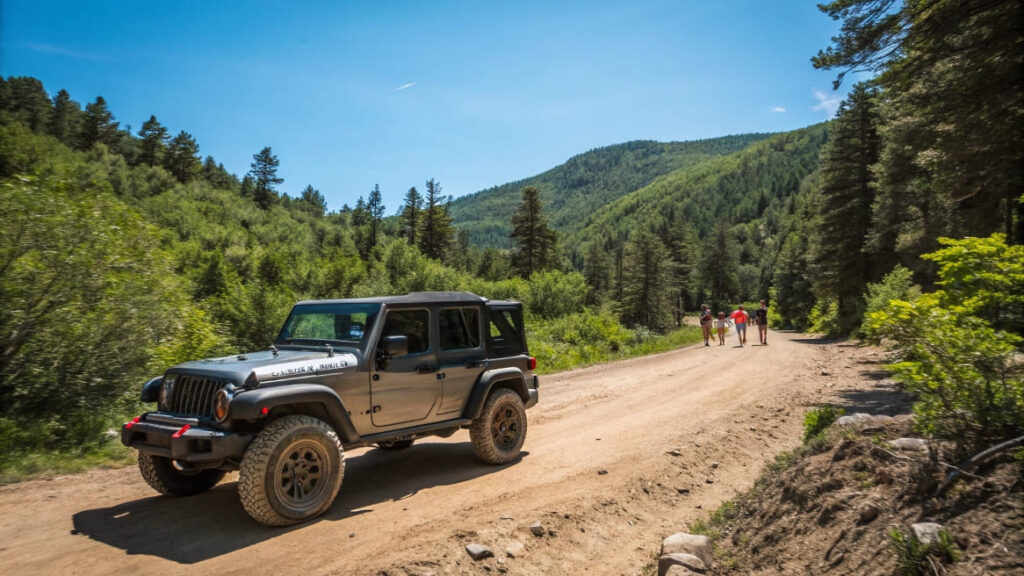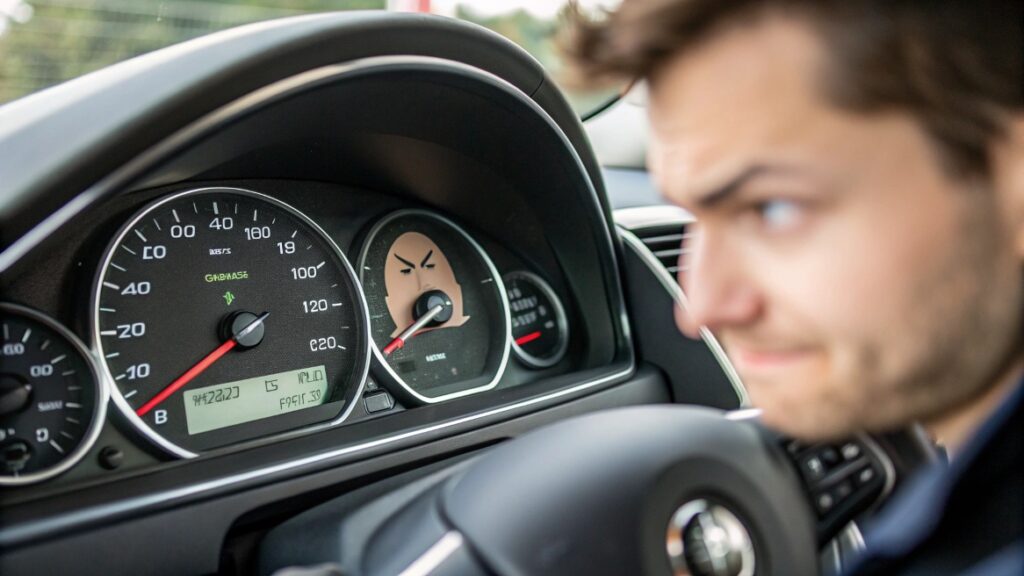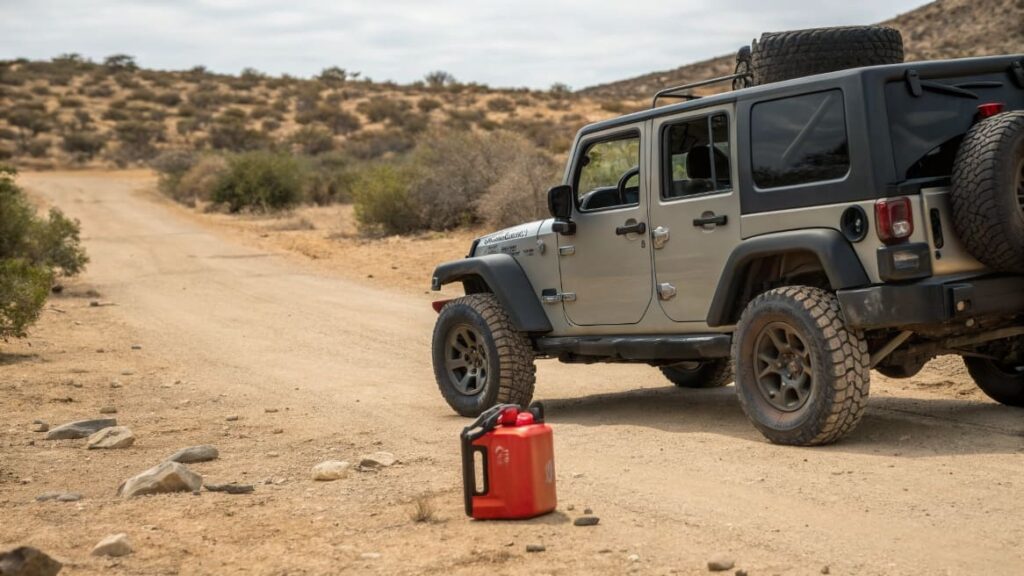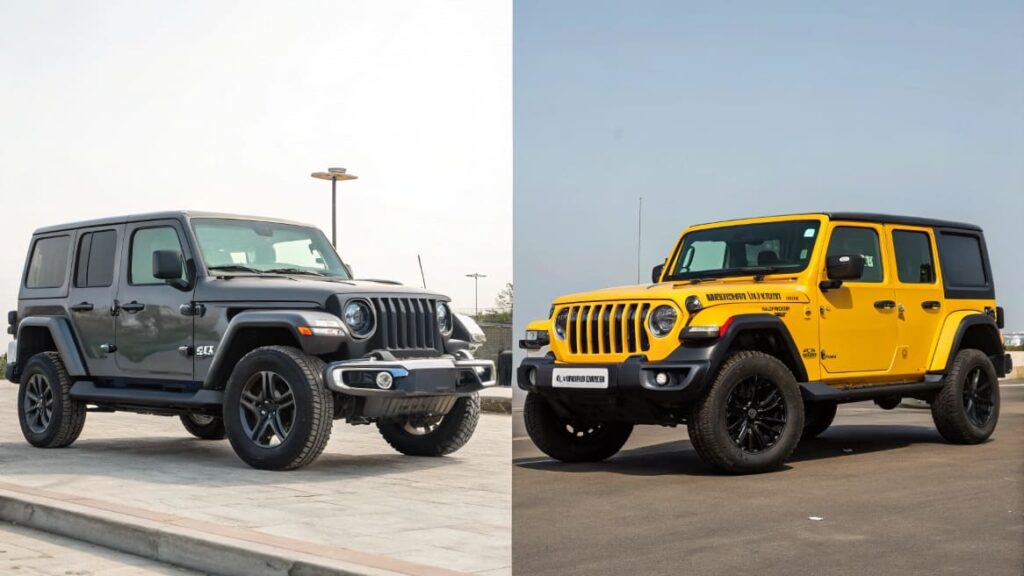Jeep Wranglers are not the most fuel-efficient vehicles due to their rugged design, but options like the 4xe hybrid and Eco Diesel offer better mileage. If you’re into off-roading, the trade-off for fuel efficiency is often worth it.
Discover real Jeep Wrangler MPG by engine & year. See which model gives best gas mileage—2.0L turbo, 3.6L V6, Eco Diesel or 4xe hybrid. Simple guide inside!
In this article, we’ll answer a common question: Are Jeep Wranglers good on gas? We’ll break down the fuel efficiency of these rugged vehicles so you can decide if it’s the right choice for you!”
Why do people love Jeep Wranglers so much?
Here’s the thing: Jeep Wranglers aren’t like most other SUVs on the road. They’re made for adventure. They’re tough, they’re rugged, and they’re built to handle places most cars wouldn’t even dare go. That’s a huge part of why people (like me) fall for them.

But — and here’s where the gas mileage comes in — that adventurous design means a few trade-offs:
- They’ve got a boxy shape (great for looking cool, bad for slipping through the wind).
- They’re heavier than your average SUV.
- They come with big tires and strong 4-wheel drive systems.
All of those things? Awesome for off-roading. Not so awesome for fuel economy.
What really affects Wrangler fuel economy?
It’s not just one thing that lowers the MPG — it’s a combo of factors working together. Let me break it down clearly:
- Engine size: Bigger engines, like the V6 and V8, naturally burn more fuel.
- Weight: Wranglers (especially the ones loaded up for off-roading) are pretty heavy, which means the engine has to work harder to move all that weight.
- Drivetrain: Four-wheel drive is great for rough trails, but it adds weight and friction that can reduce fuel efficiency.
- Aerodynamics: Let’s be honest — the Wrangler’s boxy, iconic shape isn’t cutting through air like a sports car. That means it burns more fuel at highway speeds.
- Driving style: If you’re like me and like to have a little fun — quick starts, off-roading, or aggressive driving — you’ll notice gas mileage drop faster.
Jeep Wrangler MPG: What Gas Mileage Can You Expect?
Let’s not beat around the bush — here are the numbers you need to know. I’ll keep it simple so you’re not left scratching your head.
Older Jeep Wranglers (TJ & JK models):
Older Jeep Wranglers, like the TJ (1997–2006) and JK (2007–2018) models, are a bit of a throwback, offering that rugged charm many Jeep fans love. However, when it comes to fuel efficiency, they’re not exactly the best. Typically, you’ll get around 15–18 mpg in the city and 18–21 mpg on the highway. While it’s not the greatest gas mileage, remember — these Jeeps are built for adventure, so the trade-off is part of the deal. If you’re okay with more frequent stops at the pump, they’re still an excellent choice for off-road enthusiasts.
Newer Jeep Wranglers (JL model, 2018–present):
The newer Jeep Wranglers, especially the JL model (2018–present), are definitely a step up in terms of fuel efficiency. For example, the 2.0L turbocharged 4-cylinder engine offers about 21 mpg in the city and 24 mpg on the highway. While it’s not exactly a fuel-saver compared to sedans or smaller SUVs, it’s a pretty decent improvement over the older models. So, if you’re after that classic Jeep toughness with a bit better gas mileage, the JL is a great option!
Also Read: https://offtoroad.com/2020-jeep-wrangler-rubicon-gas-type/
2024 Wrangler Examples (just to give you real numbers):
For the 2024 Jeep Wranglers, here’s what you can expect in terms of fuel efficiency:
- The Two-door Wrangler gives you around 17 mpg in the city and 23 mpg on the highway.
- If you opt for the Four-door Wrangler, you’ll get about 16 mpg city and 22 mpg highway.
- For those seeking more power, the Rubicon 392 with a V8 comes in at 13 mpg city and 17 mpg highway — definitely not the most fuel-efficient, but it’s built for performance.
- Now, if fuel economy is a priority, the EcoDiesel version shines with 22 mpg in the city and 29 mpg on the highway — the best for traditional fuel options.
- Lastly, the 4xe Hybrid offers an impressive 49 MPGe (when using a mix of electric and gas) and about 20 mpg on gas alone — perfect for those who want the best of both worlds!
So, depending on your needs, there’s a Jeep Wrangler that balances adventure and fuel efficiency!
Jeep Wrangler EcoDiesel:
The Jeep Wrangler EcoDiesel is a great choice if you want power and good fuel efficiency. It gives you 22 mpg in the city and 29 mpg on the highway, which is the best fuel economy for a regular gas-powered Wrangler. The diesel engine gives you more torque, which is perfect for towing and going off-road. You get the tough, rugged Jeep experience without using too much gas. Plus, diesel engines last longer, so you can enjoy your Jeep for many years. If you’re looking for a Jeep that’s both strong and fuel-efficient, the EcoDiesel is a great option!
Jeep Wrangler 4xe (Plug-in Hybrid):
If you’re thinking about going electric, the Jeep Wrangler 4xe is a great option to consider. It gives you up to 49 MPGe when you mix electric and gas power, which is pretty impressive for an SUV. When it’s running on gas alone, you can expect about 20 mpg, which is still solid. The 4xe is a perfect choice if you want the fun of driving a Wrangler but with better fuel efficiency. It’s a nice balance of adventure and being kind to the environment!
Is the gas mileage really that bad?

If we’re being honest (and we are), Wranglers won’t impress you at the gas pump. Compared to small SUVs or sedans, you’ll probably notice you’re filling up more often.
But here’s the thing I always tell people — Wrangler owners kinda expect that. We’re not buying these for gas savings. We’re buying them because they’re fun. And trust me, they’re worth it if you love what they offer.
How reliable and gas efficient are Wranglers as a daily driver?
If you’re like me, the idea of daily driving a Jeep Wrangler sounds like a little adventure every day. I mean, who doesn’t like the thought of cruising with the top down, feeling the wind, and maybe even veering off onto a dirt trail once in a while?
But before you get too carried away (like I did), it’s smart to ask the two big questions:
Is the Wrangler reliable for everyday driving?
Will it hurt my wallet at the gas pump?
Let’s break it all down in a simple, friendly way — so you’ll know exactly what you’re getting into.
Let’s start with reliability — will it get me from A to B every day?
Okay, here’s the good news first. Yes, Wranglers can be reliable daily drivers — but, like anything else, it comes with a couple of “know-before-you-buy” things.
Here’s what I’ve learned (and what many Jeep owners say):
- Newer Wranglers (2018 JL and up) — These are way more dependable than the older ones. Jeep has ironed out a lot of issues, and the newer engines and transmissions just feel solid.
- Older Wranglers (TJ and JK) — These still have a cult following for a reason. They’re simple and rugged, but you’ll want to stay on top of maintenance (especially suspension and steering bits).
- Parts are everywhere — This is a huge plus. If something does need fixing, parts are pretty easy to find and won’t totally drain your bank account.
- They’re built tough — Bad weather? Potholes? Gravel roads? A Wrangler shrugs all of that off — which makes daily driving feel secure and steady.
Also Read: https://offtoroad.com/are-jeeps-rwd/
Now, let’s be real — how comfy is it to drive every day?
Here’s where I’ll keep it 100 with you. It’s not luxury-car smooth.
- Road noise? Yep, it’s there. Especially if you’ve got the soft top or big tires (which, let’s face it, a lot of us do).
- Ride comfort? A bit bouncy. Remember, Wranglers are built to climb rocks — not glide over asphalt.
- Newer models help a lot. If comfort matters to you, the 2018+ Wranglers have way better seats, tech (like Apple CarPlay), and climate control that actually works well.
So, it’s not like sitting in a Lexus — but it’s also not as bad as some people make it sound, especially in the newer ones.
Alright… let’s talk about gas mileage (brace yourself):
Okay, friend-to-friend? This is the part where Wranglers don’t shine. If you’re hoping for a gas-sipping daily driver… Well, this ain’t it.
But let me explain why — so you don’t get blindsided.
Why does the Wrangler drink so much gas?

- That boxy shape cuts through air like a brick (not great on highways).
- It’s heavy — those solid axles and off-road gear aren’t light.
- 4-wheel drive adds even more weight and resistance.
- Slap on big tires (like many owners do), and MPG drops more.
Real-world numbers for 2024 Wranglers:
| Model | City MPG | Highway MPG |
| 2-door Wrangler | 17 | 23 |
| 4-door Wrangler | 16 | 22 |
| Rubicon 392 (V8) | 13 | 17 |
| EcoDiesel (best MPG) | 22 | 29 |
| 4xe Hybrid (MPGe) | 49 MPGe | — |
Simply put — if you’re coming from a small SUV or sedan, it’ll feel like you’re at the gas station all the time. But if you’re okay with that trade-off (like a lot of Wrangler folks are), it might not bother you as much as you think.
So… is it a smart daily driver or not?
Here’s how I see it after driving Wranglers myself: It all depends on what matters most to you.
It’s a great daily driver if you:
- Love a rugged, go-anywhere feel.
Don’t mind paying a little more for gas.
- Want something that handles snow, rain, and bad roads without blinking.
Are okay with some wind noise and a bumpier ride.
Do Jeep Wranglers Take a Lot of Gas?
So, you’re thinking about a Jeep Wrangler, and you’re probably wondering, “Do these things drink a lot of gas?” Well, the short answer is, yes, they do. But before you start second-guessing your Jeep dreams, let’s break it down and talk about why and what that really means for you.
Why do Wranglers use more gas?
Okay, so let’s get into the nitty-gritty of it. Jeep Wranglers are designed for a rugged, off-road experience, which is awesome but does come with a bit of a gas price. Here’s what’s going on under the hood:
- They’re heavy — All those heavy-duty parts like the solid axles and reinforced frame add weight. More weight means the engine needs to work harder to move it, which uses more gas.
- Boxy shape — The cool, iconic Jeep look is part of what makes it stand out. But that boxy shape isn’t the best when it comes to cutting through air, so at higher speeds, it eats up more fuel.
- 4-wheel drive — Wranglers are built to handle all kinds of terrain, and their 4WD system is perfect for that. But it also adds some extra weight and friction, which takes a toll on fuel efficiency.
- Big tires — Those off-road tires may look awesome and give you great grip, but they’re a bit of a drag on fuel efficiency, too.
Also Read: https://offtoroad.com/jeep-wrangler-gas-light-how-many-miles/
How bad is it really?
Now that we know why, let’s talk about how much gas a Wrangler actually uses. You’re probably wondering, “What are the real numbers here?” Let’s take a look:
| Model | City MPG | Highway MPG |
| 2-door Wrangler (V6) | 17 | 23 |
| 4-door Wrangler (V6) | 16 | 22 |
| Rubicon 392 (V8) | 13 | 17 |
| EcoDiesel (best MPG) | 22 | 29 |
| 4xe Hybrid (MPGe) | 49 MPGe | — |
As you can see, Wranglers aren’t exactly champs when it comes to fuel economy. For comparison, many smaller SUVs or cars can easily reach 30-35 mpg. So yeah, if you’re used to driving something more fuel-efficient, you’ll definitely notice more trips to the gas station.
But here’s the thing: Even though Wranglers aren’t the most fuel-efficient, they’re not built for that. Most people (myself included) don’t get a Jeep to save on gas — they get it because it’s fun, tough, and ready for adventure.
Is the trade-off worth it? For a lot of people, absolutely. The feeling of freedom you get behind the wheel of a Jeep, especially off-road, is hard to beat. Sure, you might spend a little more on gas, but if you’re after that iconic Jeep experience, it’s totally part of the deal.
There are more efficient options!
If gas savings are important to you, here’s some good news:
- The EcoDiesel option gives you 22 city / 29 highway mpg, which is the best traditional fuel economy for a Wrangler.
- The 4xe Plug-in Hybrid is a game-changer, offering an impressive 49 MPGe. If you can charge it regularly, you’ll save a ton on gas.
So, even though Wranglers aren’t the best at saving fuel, there are options if you’re looking for a little more efficiency.
Best Jeep Wrangler for Gas Mileage (By Engine):
If you’re looking to save on gas, the 4xe Plug-in Hybrid is your best choice. Here’s why:
- Fuel Economy: It gives you 49 MPGe (miles per gallon equivalent), which means you can drive on electric power for short trips and save a ton on fuel.
- Off-road ready: Plus, it still packs all the rugged Jeep performance you love.
If you prefer a non-hybrid, the EcoDiesel is a solid second option:
- Fuel Economy: It gets 22 city / 29 highway mpg, giving you good mileage with a diesel engine.
So, if gas efficiency is your goal, the 4xe Hybrid is the clear winner. If you’re okay with a traditional engine, the EcoDiesel is a great backup!
Petrol vs. Diesel Jeep Wrangler: Which is Better?
So, you’re wondering whether to go for a petrol or diesel Jeep Wrangler, right? Let’s break it down simply so you can make a decision that works for you.

Petrol Jeep Wrangler:
If you’re leaning towards petrol, here’s why it might be a good choice:
- Lower upfront cost: Petrol models are usually cheaper to buy.
- Smoother, quieter ride: If you prefer a more refined driving experience, petrol engines tend to be quieter and feel a bit smoother on the road.
- Easier refueling: Petrol stations are more common, so you’ll have no trouble finding one when you need it.
- Lower emissions: Petrol engines tend to produce fewer nitrogen oxides, which is a win for the environment.
However, the downside is that petrol engines tend to be less fuel-efficient, meaning you’ll need to refuel more often.
Diesel Jeep Wrangler:
Now, if diesel sounds more like your style, here’s why it could be a better fit for you:
- Better fuel economy: Diesel engines are known for being more fuel-efficient, meaning fewer trips to the pump.
- More torque: This is a huge advantage if you’re into towing or off-roading because diesel engines provide that extra muscle.
- Longer engine life: Diesel engines tend to be more durable and last longer, making them a solid long-term investment.
On the flip side, diesel engines come with a higher upfront cost, and finding a diesel station might be trickier depending on where you live. Plus, they can be a little louder and rougher than petrol engines.
Are there Jeep Wrangler models with better gas mileage than others?
Yes, some Jeep Wrangler models are definitely better on gas than others. If you’re looking to save a bit more at the pump, here’s a breakdown of your best options:
Jeep Wrangler 4xe (Plug-in Hybrid):
If fuel efficiency is a top priority for you, the 4xe is the one to beat. With up to 49 MPGe (miles per gallon equivalent), it lets you drive on electric power for short trips, which means fewer visits to the gas station. It’s the perfect mix of rugged off-roading and better fuel economy.
Jeep Wrangler EcoDiesel:
For those who prefer a diesel engine, the EcoDiesel model is a solid pick. Offering 22 mpg in the city and 29 mpg on the highway, it gives you good fuel efficiency without sacrificing too much of that classic Jeep power. Plus, it’s great for towing and longer trips.
Also Read: https://offtoroad.com/how-much-to-paint-a-jeep-wrangler/
Jeep Wrangler with the 2.0L Turbocharged 4-cylinder:
If you’re not keen on hybrid or diesel, the 2.0L turbo engine offers a great balance. It gives you about 21 mpg in the city and 24 mpg on the highway, which is definitely better than the bigger V6 options. It’s a good middle ground for fuel-conscious drivers who still want some punch on the road.
So, depending on your preference—whether you’re into hybrids, diesel, or just a more efficient 4-cylinder engine—there’s a Jeep Wrangler that can suit your needs without burning through as much gas. It’s all about finding the right balance for your lifestyle!
FAQ’s
1.How does the weight of the Jeep Wrangler affect its fuel economy?
The weight of a Jeep Wrangler really affects its gas mileage. Simply put, the heavier the vehicle, the harder the engine has to work, using more fuel. Plus, with all the off-road gear and 4WD, the weight adds up, making it less fuel-efficient, though it’s all part of the tough, adventure-ready package Jeep is known for!
2.Do Jeep Wranglers perform better on off-road terrain or on highways in terms of gas mileage?
Jeep Wranglers tend to do better off-road than on highways. Off-roading involves slower speeds, which helps save fuel. On highways, the Wrangler’s boxy shape and weight create more air resistance, reducing fuel efficiency.
3.What is the most fuel-efficient option for someone who loves off-roading?
If you’re someone who loves off-roading but also wants to save on gas, the Jeep Wrangler 4xe Plug-in Hybrid is your best bet. It gives you an impressive 49 MPGe, so you can cruise around on electric power for shorter trips and still tackle tough trails when you need to. It’s the perfect balance between fuel efficiency and rugged, off-road fun!
4.Are newer Jeep Wranglers more fuel-efficient than older models?
Yes, newer Jeep Wranglers (2018 and up) are more fuel-efficient than older models. With better engine tech and improvements, they offer slightly better gas mileage, making them a bit easier on the wallet at the pump.
5.Are Jeeps expensive to maintain?
Jeep Wranglers can be a bit pricier to maintain due to their rugged build and off-road features. Parts, especially custom ones, can cost more. However, with regular maintenance, they’re reliable and can last a long time, making the investment worth it for many owners.
Conclusion
Jeep Wranglers may not be the best when it comes to gas mileage, but if you’re someone who loves adventure, it’s totally worth it. Yes, you’ll stop at the gas station a little more, but the fun of driving a tough, go-anywhere Jeep makes up for it. If you’re all about the journey and the freedom, the Wrangler’s got your back!